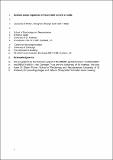Sodium pump regulation of locomotor control circuits
Abstract
Sodium pumps are ubiquitously expressed membrane proteins that extrude three Na+ ions in exchange for two K+ ions using ATP as an energy source. Recent studies have illuminated additional, dynamic roles for sodium pumps in regulating the excitability of neuronal networks in an activity-dependent fashion. Here we review their role in a novel form of short-term memory within rhythmic locomotor networks. The data we review derives mainly from recent studies on Xenopus tadpoles and neonatal mice. The role and underlying mechanisms of pump action broadly match previously published data from an invertebrate, the Drosophila larva. We therefore propose a highly conserved mechanism by which sodium pump activity increases following a bout of locomotion. This results in an ultraslow afterhyperpolarisation (usAHP) of the membrane potential that lasts around 1 minute, but which only occurs in around half the network neurons. This usAHP in turn alters network excitability so that network output is reduced in a locomotor interval-dependent manner. The pumps therefore confer on spinal locomotor networks a temporary memory trace of recent network performance.
Citation
Picton , L D , Zhang , H & Sillar , K T 2017 , ' Sodium pump regulation of locomotor control circuits ' , Journal of Neurophysiology , vol. 118 , no. 2 , pp. 1070-1081 . https://doi.org/10.1152/jn.00066.2017
Publication
Journal of Neurophysiology
Status
Peer reviewed
ISSN
0022-3077Type
Journal article
Description
The authors are grateful for the financial support of the BBSRC (grant numbers: BB/M024946/1 and BB/JO1446X/1), the Carnegie Trust and the University of St Andrews.Collections
Items in the St Andrews Research Repository are protected by copyright, with all rights reserved, unless otherwise indicated.

